Eurovision Grand Final: When is the Eurovision 2023 final and who is in it?
- Published
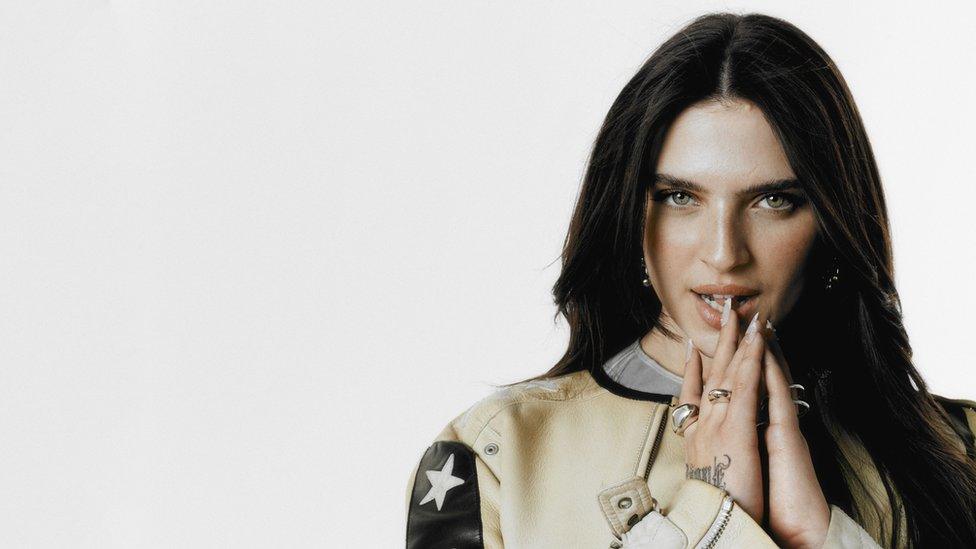
Mae Muller will represent the UK
The line up for Saturday's Eurovision Song Contest final has been confirmed, following Thursday's knock-out semi-final.
26 countries will compete for the crystal microphone on Saturday.
The UK is staging this year's contest on behalf of 2022 winners Ukraine.
When is the Eurovision Grand Final?
The grand final takes place at 20:00 BST on Saturday, broadcast live from Liverpool Arena on BBC One, and will last for four hours.
It is the first Eurovision Song Contest to be held in the UK for 25 years.
The competition is made up of two semi-finals and the grand final.
The first and second semi-finals were held on Tuesday and Thursday, where 20 acts qualified to join the "big five" that have a guaranteed spot in the final -France, Germany, Italy, Spain and United Kingdom- and last year's winner, Ukraine.
Who qualified for the final?
The winners of Tuesday's semi-final were Croatia, Czechia, Finland, Israel, Moldova, Norway, Portugal, Serbia, Switzerland and Sweden. Azerbaijan, Ireland, Latvia, Malta and The Netherlands failed to qualify.
On Thursday, Albania, Armenia, Australia, Austria, Belgium, Cyprus, Estonia, Lithuania, Poland and Slovenia got through to the final.


The running order for the final has been revealed. Austria will open the show and final act will be UK's Mae Muller.
Who will represent the UK?
Mae Muller will represent the UK with her track I Wrote A Song, the country's first female Eurovision entrant for five years.
She was born in 1997 - the year the UK last won Eurovision - and has previously supported Little Mix on tour.
Allow YouTube content?
This article contains content provided by Google YouTube. We ask for your permission before anything is loaded, as they may be using cookies and other technologies. You may want to read Google’s cookie policy, external and privacy policy, external before accepting. To view this content choose ‘accept and continue’.
As in recent years, there was no televised national selection show.
Instead, the BBC chose the winner in consultation with a management company.
All the entries for this year's contest can be found in our guide to every country's song.
Can I still get Eurovision tickets?
The short answer is no. When tickets for all of the Eurovision shows went on sale at 12:00 GMT on Tuesday 7 March they sold out.
A final batch were released at 12:00 BST on Monday, 24 April.
As well as the three televised live shows - the semi-finals and the final - there are six preview shows which double as dress rehearsals.
Watch: Night one's most iconic Eurovision performances (UK only)
Prices ranged from £90 to £290 for the live semi-final shows, and from £160 to £380 for the live grand final. Preview show tickets cost between £30 and £280.
About 3,000 tickets have been made available to Ukrainians living in the UK.
How can I watch Eurovision?
More than 160 million people around the world are expected to watch the 2023 final.
In the UK, Eurovision will be broadcast live on BBC One.
The BBC's coverage will be hosted by Graham Norton, Hannah Waddingham, Alesha Dixon and Ukrainian singer Julia Sanina.
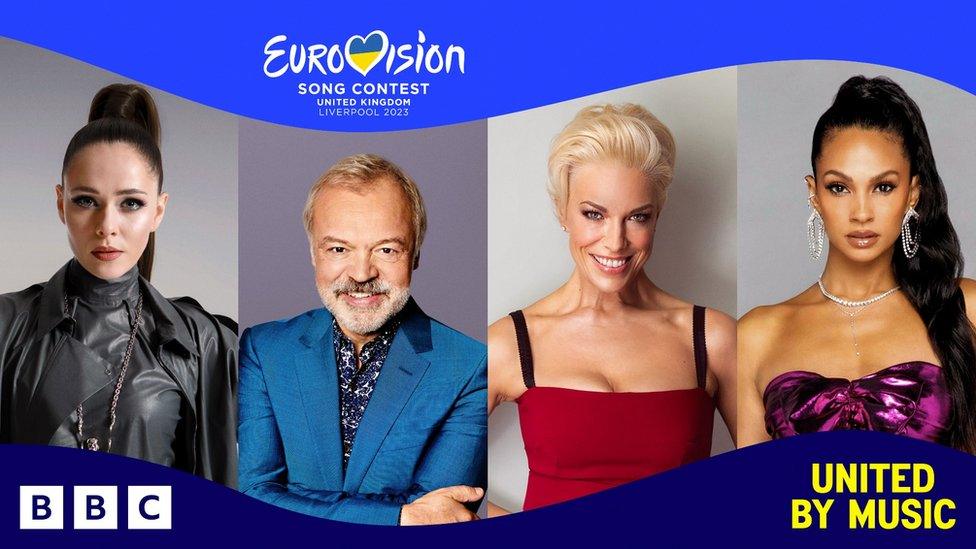
This year's competition is being held in Liverpool, on behalf of Ukraine, who won last year's event
In addition, a special fan zone is accommodating up to 25,000 people at Liverpool's Pier Head, close to the arena.
Cultural events around the competition include a submarine parade through the city and a rave which will take place simultaneously in Liverpool and Kyiv.
Why is the UK hosting Eurovision?
Ukraine's Kalush Orchestra won the 2022 Eurovision song contest with their song Stefania.
Normally, the winning country hosts the following year's competition, but the ongoing war in Ukraine makes this impossible.
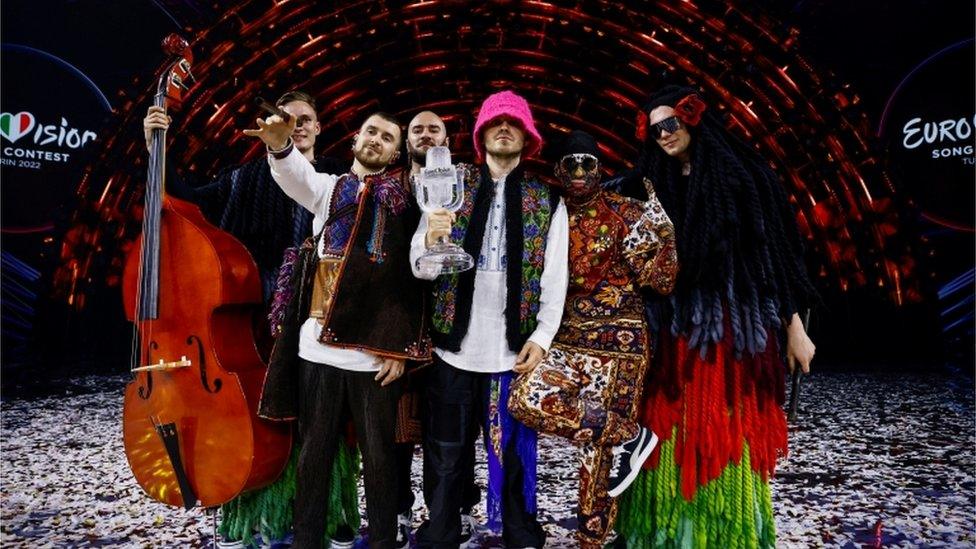
Ukraine's Kalush Orchestra sold their Eurovision trophy for £712,000 to raise money for the country's war effort
The European Broadcasting Union (EBU), which organises the contest, invited the UK to host on Ukraine's behalf as UK contestant Sam Ryder was the runner up in the 2022 show.
It will be the ninth time the UK has hosted the competition, and the fifth time it has done so on behalf of another country.
How much does Eurovision cost?
Broadcasters from the 37 countries taking part each pay an entrance fee to the EBU. In recent years these fees have totalled about £5m, external. The BBC does not make its contribution public.
Russia was expelled from the competition following its invasion of Ukraine.
BBC News has been told countries have been asked to pay more to make up for its loss. Three countries have said they will not take part as a result of the increase.
Some broadcasters are also thought to have been be worried about the additional costs of transporting equipment to the UK now it is no longer a member of the EU.
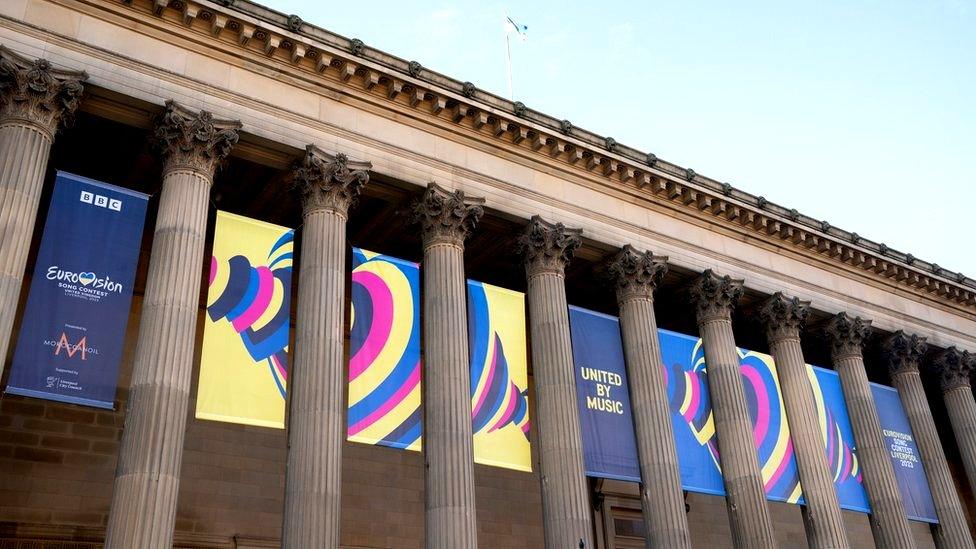
The 2023 contest's slogan is "United by music"
Staging the event is expected to cost the BBC between £8m and £17m.
The UK government has pledged £10m towards operational costs, while local authorities in Liverpool have committed £4m.
How does the voting work?
The semi-finals are decided wholly by a public vote, from competing countries and people in the rest of the world.
The six countries automatically guaranteed entry to the final vote on just one of the semi-finals. On Tuesday, that's Germany, France and Italy. On Thursday, that's the UK, Ukraine and Spain.
In the final, it's more complicated. Each of the 26 countries has a jury whose members rank all the final performances.
They award a fixed number of points to their top 10 acts: Respectively 12 points, 10 points, eight, seven, six, five, four, three, two and one.
The jury results are announced by each country in turn on the night.
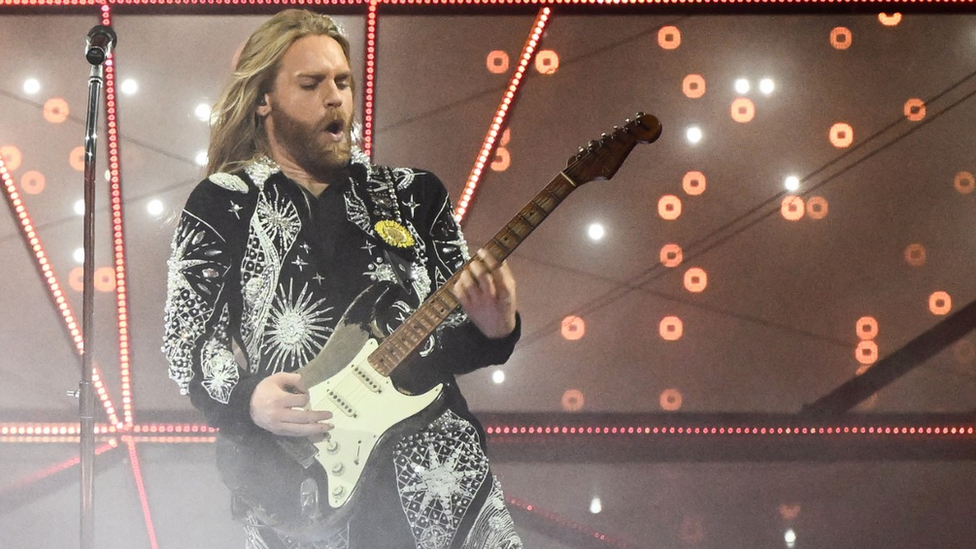
The UK's Sam Ryder finished second in 2022, having scored the third-highest jury vote score in Eurovision history
Competing countries then award points to the other contestants based on viewer votes, following the same scoring system.
For the first time, in 2023 public votes from outside Europe will play a part. Worldwide votes will be combined and counted as if they are another country.
Why does Australia take part in Eurovision?
Eurovision has long been popular in Australia, and in 2015 it was invited to send an act as part of the contest's 60th anniversary celebrations.
It has been allowed to take part ever since. Like European countries, it pays a fee to the EBU to help fund the event.
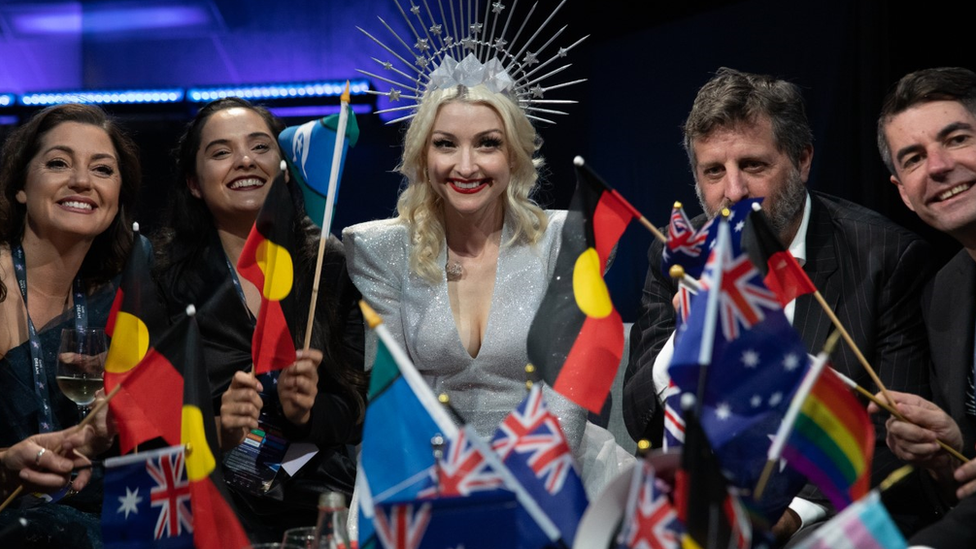
Kate Miller-Heidkes represented Australia in 2019 in Tel Aviv
However, Australia is barred from hosting. If it ever won, it would have to nominate a European nation to stage the contest on its behalf.
Other non-European countries, including Israel, are also allowed participate because they are members of the EBU.
Eurovisioncast is available on BBC Sounds, or search wherever you get your podcasts from.
